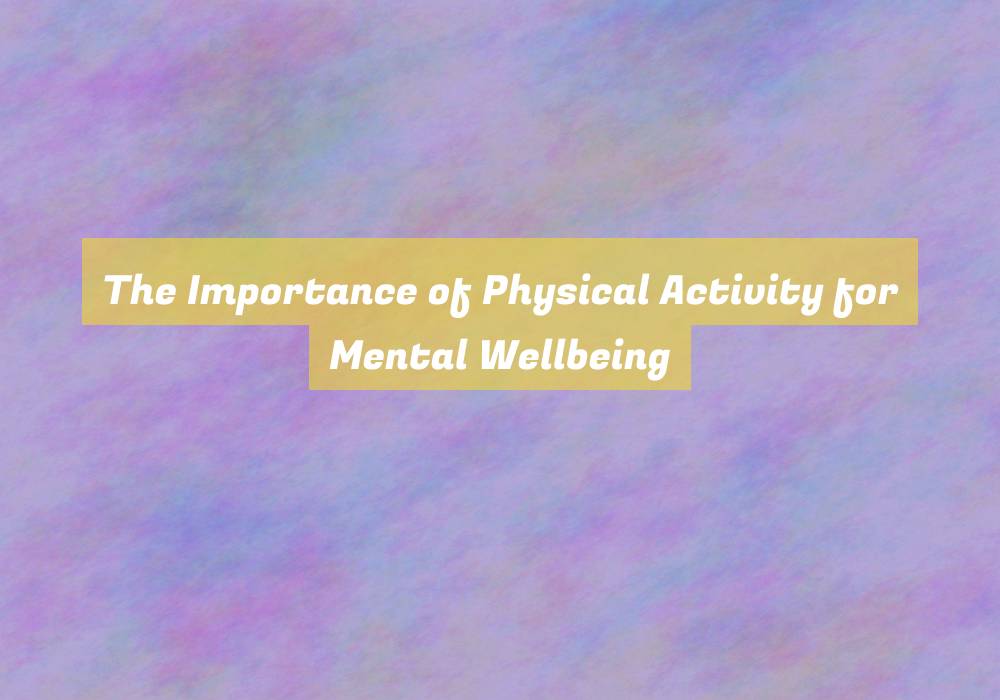The Importance of Physical Activity for Mental Wellbeing
You may think that physical activity is only important for your physical health, but it also plays a crucial role in maintaining your mental wellbeing.
The impact of exercise on your mental state is often underestimated, yet it has been proven to be significant.
The benefits extend beyond just physical fitness and have a direct correlation to your mental health.
As you consider the connection between physical activity and mental wellbeing, youG??ll uncover how exercise influences various aspects of your psychological state.
The Mental Health Benefits of Exercise
Engaging in regular physical activity can significantly improve your mental wellbeing. When you exercise, your body releases endorphins, which are natural mood lifters. These endorphins can help reduce feelings of stress, anxiety, and depression, leaving you with a more positive outlook.
Additionally, physical activity can improve your sleep quality, which is essential for good mental health. Getting enough rest can help regulate your mood and improve your ability to cope with daily stressors.
Regular exercise also provides a sense of accomplishment and self-confidence, which can boost your self-esteem and overall mental wellbeing. Furthermore, physical activity can serve as a distraction from negative thoughts, allowing you to focus on the present moment and experience a mental break from worries and ruminations.
Whether itG??s a brisk walk, a yoga session, or a high-intensity workout, finding an activity you enjoy can have profound effects on your mental health. So, lace up your sneakers and take advantage of the mental health benefits that come with staying physically active.
The Connection Between Physical Activity and Stress Reduction
Regular physical activity can significantly reduce stress and improve your overall mental wellbeing. When you engage in exercise, your body releases endorphins, which are natural chemicals that act as painkillers and improve your mood. This can help alleviate feelings of stress and anxiety, leaving you feeling more relaxed and at ease.
Additionally, physical activity can serve as a form of meditation in motion, allowing you to focus on the present moment and divert your attention away from the stressors in your life.
Moreover, participating in regular physical activity can provide you with a sense of accomplishment and self-confidence, which can help combat the negative effects of stress. Setting and achieving fitness goals can boost your self-esteem and provide a healthy outlet for managing and reducing stress levels.
Furthermore, exercise can also improve your quality of sleep, which is crucial for managing stress. When you get better sleep, youG??re better equipped to handle the challenges and pressures of daily life, leading to an overall reduction in stress and an improvement in mental wellbeing.
How Exercise Impacts Mood and Self-Esteem
When you incorporate physical activity into your routine, you naturally boost your mood and enhance your self-esteem, contributing to an overall improvement in your mental wellbeing.
Exercise triggers the release of endorphins, often referred to as the bodyG??s natural feel-good chemicals. These endorphins act as natural painkillers and also help reduce stress, leading to a more positive and uplifted mood.
Additionally, engaging in regular physical activity can improve your self-esteem. As you set and achieve fitness goals, you gain a sense of accomplishment and empowerment, which can carry over into other aspects of your life. Furthermore, the physical changes that result from exercise, such as improved strength and stamina, can enhance your self-image and confidence.
The act of dedicating time to take care of your body sends a powerful message to yourself that youG??re worthy of care and attention, ultimately boosting your self-esteem.
Incorporating Regular Exercise for Overall Wellbeing
To achieve overall wellbeing, consider integrating regular exercise into your daily routine. Incorporating physical activity into your life can have a profound impact on your overall wellbeing.
Firstly, it can improve your physical health by enhancing cardiovascular fitness, strengthening muscles, and boosting immunity. This, in turn, can lead to increased energy levels and better sleep quality.
Regular exercise also plays a crucial role in managing stress and anxiety. When you engage in physical activity, your body releases endorphins, which are natural mood lifters, helping you feel more relaxed and content. Additionally, exercise provides an opportunity to disconnect from daily stressors, offering a much-needed mental break.
Moreover, it can enhance your cognitive function, improving your ability to focus and think critically.
Furthermore, incorporating regular exercise into your routine fosters a sense of accomplishment and self-discipline, which can positively impact your overall mental wellbeing. Setting and achieving fitness goals can boost self-esteem and confidence.
Whether itG??s a brisk walk, yoga, or a gym session, finding an activity you enjoy can make the process more enjoyable and sustainable. By making exercise a regular part of your life, you can experience an overall improvement in your mental and physical wellbeing.
Conclusion
So, when it comes to taking care of your mental wellbeing, physical activity is key. It not only helps reduce stress, but also improves your mood and self-esteem.
By incorporating regular exercise into your routine, you can experience the mental health benefits that come with it.
So, lace up those sneakers and get moving for a happier and healthier mind.







